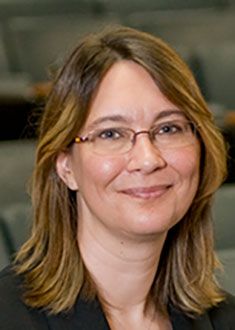
Anyone who has taken a course in higher education is familiar with end-of-semester evaluations. They typically come in the form of surveys that employ Likert scales, which score responses along a range that spans from “strongly agree” to “strongly disagree.” Students are presented with statements such as Instructor demonstrated knowledge of subject matter and check a box to indicate their level of agreement.
This is precisely the sort of summative assessment that Veronica Michaelsen, M.D., Ph.D., newly appointed Assistant Dean for Evaluation at the George Washington University School of Medicine and Health Sciences (SMHS), plans to avoid as she revises the way we evaluate students’ experience of the SMHS curriculum as an integrated whole.
Michaelsen, who hails from the University of Virginia School of Medicine where she was Director of Curriculum Design and co-Director for Evaluation, thinks of evaluation as quality assurance for education. “We’re collecting data from a lot of different sources to determine whether we are doing what we want to do, and how well we are doing it,” she says.
In Michaelsen’s view, the classic interpretation of evaluation as a method of determining what’s “best” does not apply. “In education, we don’t have the luxury of doing a randomized control study where we do one thing with half of a class and something else with the other half.” Instead, it’s about collecting the data that people need in order to do their jobs better and finding ways to get faculty invested in the evaluation process.
Students also play an important role in evaluation, and they can benefit from the process as well as the outcome. “Medical students are going to be involved in peer evaluation and review for the rest of their careers and they need to learn how to do it in a constructive, professional way,” Michaelsen explains. “It’s very difficult to carve out time for that in the curriculum, but it’s something we can do through the evaluation process.”
Alex Stagnaro-Green, M.D., M.H.P.E., senior associate dean for education at SMHS, says that Michaelsen’s experiences provide her with a “rich and diverse background with which to lead the school in developing innovative and cutting-edge evaluation tools. This is critically important at this point in time as we are developing a new medical school curriculum, which will be implemented in the fall of 2014,” he says.
Unlike in other fields where a well-designed course can remain relevant for a decade or more, medical school curricula is constantly changing. “Five years from now, the technology will have changed, the content will have changed, and our learners will have changed,” Michaelsen says. As for how she plans to stay on top of those changes and what they mean for the curriculum – “Well, I’ll be drinking a lot of coffee with people,” she says.


